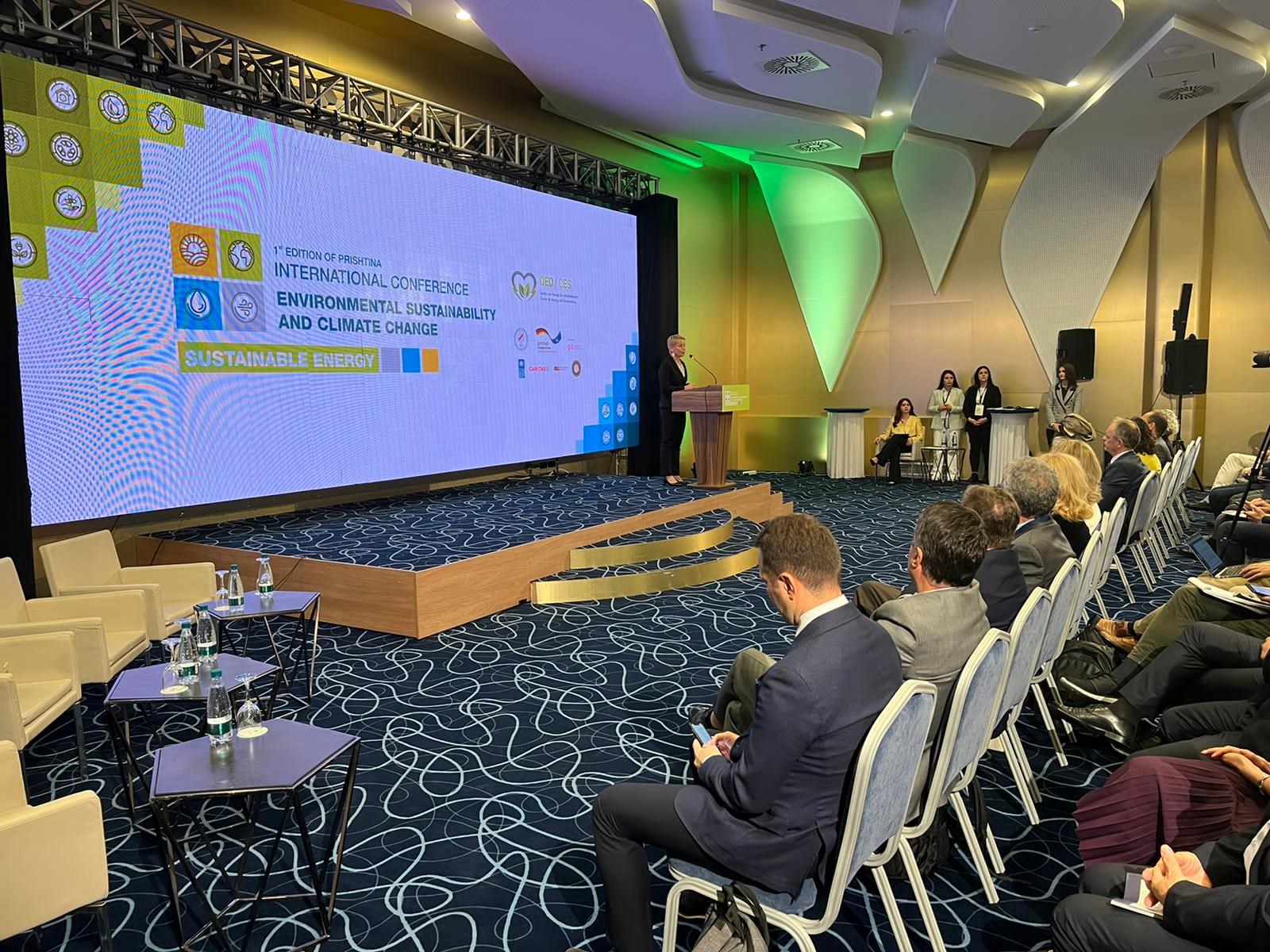Remarks by Maria Suokko, UNDP Resident Representative, at the opening of the 1st Edition of Prishtina International Conference titled “Environmental Sustainability and Climate Change”
September 26, 2022

Honorable Rector Naser Sahiti,
Honorable Artane Rizvanolli, Minister of Economy,
Honorable Liburn Aliu, Minister of Environment, Spatial Planning and Infrastructure,
Dear Sarah Olmstead, Director of MCC,
Representatives from the Center for Energy and Sustainability,
Dear Students, Ladies and Gentlemen,
Dear Participants,
I am pleased to join this high-level and very timely event on behalf of UNDP. It is wonderful to see the various disciplines coming together to discuss environmental and climate challenges – and possible solutions to them.
We find ourselves in a truly challenging and unpredictable world today.
UNDP’s recent Human Development Report tells us that the growing global turmoil has led to unprecedented reversals in human development progress in 90 percent of countries around the world.
The pandemic – compounded by inequalities, climate shocks, rapid technological innovation, and social mistrust – has whipped up a perfect storm to wipe out human progress.
Human Development reversing for a second consecutive year has led to a backslide in Human Development never seen before, setting us back to levels recorded at the start of the 2030 Agenda for Sustainable Development and the adoption of Paris Agreement in 2016.
We are faced with a new uncertainty complex: Humanity’s biggest challenges – the climate and biodiversity crises, inequalities and political polarization as well as technological upheavals - are piling up and feeding off each other.
Amidst all this, we find ourselves in the middle of energy and economic crisis.
All this tells us that development can longer be approached in silos. All disciplines and knowledge need to be harnessed to find solutions to the most complex challenges that we are facing as humanity. New growth models are needed – to ensure we can move forward within the planetary boundaries.
Earlier this week, the UN Secretary-General Antonio Guterres called upon the world leaders to end the suicidal war against nature. As he stated, this war on nature will have devastating consequences for us all. It is fuelling the climate crisis, driving species to extinction, and destroying ecosystems. It is driving conflict and pandemics, and jeopardizing our Sustainable Development Goals.
How we approach the climate challenge will determine the future of our species, but also our lives at present. We need to realize that climate action does not have to threaten economic growth and prosperity, and the wellbeing of people - if there is a clear vision and a plan on how to get to a net-zero world.
Kosovo is at a turning point - determined to attain energy security, accelerate the use of renewables, and lower greenhouse gas emissions – while pursuing a long-term vision for sustainable development as defined by the new National Development Strategy.
We congratulate Kosovo institutions for setting ambitious goals and having a clear climate change agenda. While not party to the international agreements, Kosovo is demonstrating a strong commitment to stepping up climate action in line with global ambitions. We are pleased to see the Kosovo Climate Change Council becoming active with the aim to facilitate an integrated response to climate change – by ensuring that climate change concerns are taken into account in all areas of life, and we also happy to see that there is readiness among institutions to integrate gender perspective in the climate response.
As UNDP, we are supporting local climate action in dialogue with communities and various women and men – to understand their needs and priorities – and to plan the interventions accordingly. We need to pay special attention to understanding how the impacts of climate change affects differently women and men, how it affects differently the various communities.
Earlier this week, Pristina hosted the Western Balkans Digital Summit. While green and digital transition might seem like two distinct issues, they are a twin challenge: neither can succeed without the other. Cutting emissions in the most carbon intensive sectors can be scaled through digital transformation. For the twin transition to be successful, investments are needed in research & innovation, in upskilling & reskilling.
Achieving a just and equitable transition is also an opportunity. Evidence shows that if managed well, the transition can be a powerful driver in creating green jobs, social justice, and eradicating poverty.
Climate resilient development can only be secured when everyone is onboard. Central and local institutions, the private sector, civil society - and academia. And most importantly – action starts with individuals and communities. The choices we make in our everyday lives.
As UNDP, we are supporting local climate action in dialogue with communities – to understand their needs and priorities – and to plan the interventions accordingly. We need to pay special attention to understanding how the impacts of climate change affects differently women and men, how it affects differently the various communities.
As I started, we live in an increasingly volatile world affected by multiple crises. But events like this give us hope – when decision-makers and scientists come together to explore solutions to the defining challenges of humanity, and I am also very glad that organizers are also in our Women in STEM network and that together we are also working in the gender equality agenda of having more women in STEM fields
The science is clear. This has to be the decade of decisive climate action. By working together, we can create futures in which both people and the planet thrive – despite the uncertainties around us. Where we go from here - is up to us.
I wish you a successful event and interesting discussions today!

 Locations
Locations